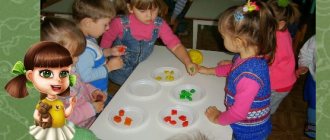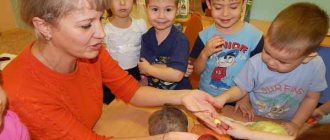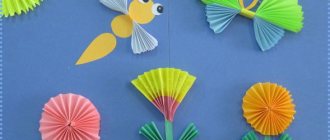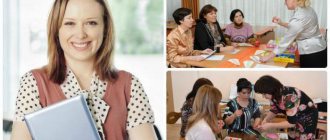Individual teacher plan for self-education
In order to fully study the topic, as well as meet the deadlines determined for this, the teacher should build the course of the research according to a specific plan:
- Decide on a topic. The selection criterion is the difficulties that arise in the teacher’s methodological work with children. Thus, for many educators it can be difficult to get children to learn the rules of good manners (children “forget” to say “thank you,” “please,” etc.). In this case, it makes sense to study the topic “Speech development - rhetoric lessons and speech etiquette.”
- Formulate the goals and objectives of the work.
- Consider forms of activity within the topic for interaction with children, parents and colleagues.
- Draw up a plan for work, title and describe the stages of mastering theory, practice and summing up.
- Study the theoretical basis of the issue and systematize existing teaching experience (write out the first part, the theoretical one).
- Develop a system for the practical implementation of the theory (topics of classes, methods and techniques for solving specific research problems, etc.).
- Present the practical results obtained from the implementation of the theoretical framework.
Table: example of a plan for self-education in kindergarten (fragment)
| Author | Natalya Onoprienko, teacher of the preschool educational institution “Kindergarten No. 15 “Rucheyok”, Rtishchevo, Saratov region | ||
| Name | “Gender education of preschool children” | ||
| Chapter | Deadlines | The content of the work | Practical solutions |
| Studying methodological literature | September - May | 1. Adler A. Raising children. Interaction of the sexes. - Rostov n/d: Phoenix, 1998. 2. Doronova T.N. Girls and boys 3–4 years old in family and kindergarten. - M.: “LINKA-PRESS”, 2009. 3. Eremeeva V.D., Khrizman T.P. Boys and girls: Teach differently, love differently. M.: Educational literature, 2008. 4. Lykova I. A. Girls playing. Gender approach in education. - M.: Tsvetnoy mir, 2014. 5. Lykova I.A. Boys are playing. Gender approach in education. - M.: Tsvetnoy mir, 2014. 6. Sokolova S.E. Gender differences in the development of speech in preschool children. // Preschool pedagogy, No. 2, 2013. 7. Shelukhina I.P. Boys and girls: A differentiated approach to raising preschool children. - M.: Sfera, 2006. | Analysis of the studied literature (in terms of self-education). |
| Work with children | September - May | Organization of joint and independent play activities to form a child’s value-based attitude towards himself, towards the opposite sex, towards his family. | Gender education games. |
| November |
| Thematic week “Here they are: boys and girls!” | |
| February |
| Thematic week “Our Defenders” | |
| March |
| Thematic week "Holiday of girls, mothers, grandmothers." | |
| April |
| Thematic week “In the world of professions” | |
| Working with family | September | Questioning parents to determine individual and gender differences in preschool children | Questionnaires for parents “Gender education of preschoolers in the family” |
| October | Involving parents in creating a subject-development environment in the group. | Design of a corner for role-playing games, didactic games, a mummering corner, taking into account the interests of boys and girls. | |
| January | Consultation “The importance of play for the assimilation of future social roles by boys and girls.” | Information in the corner for parents. | |
| April | Tips “How to raise a girl?”, “How to raise a boy?”. | Booklets for parents. | |
| May | Open lesson “We are boys, we are girls.” | Open Day. | |
| Self-realization | September | Collecting information to compile a card index of gender education games. | Card index of plot-role-playing, didactic, outdoor games on gender education. |
| November | Consultation for teachers “Gender education of preschool children in preschool settings.” | Speech at the pedagogical council. | |
| February | Message and presentation from the work experience “The originality of the play activities of girls and boys of primary preschool age.” | Speech at a workshop. | |
| Report | May | Report on the work done on the topic of self-education at the final teachers' meeting. | Speech at the teachers' meeting. |
| Quote from: https://prodetskiysad.blogspot.ru/2017/07/samoobrazovanie-gendernoe-vospitanie-doshkolnikov.html | |||
Stages of working on a topic
To successfully work on the topic of self-education, the teacher needs to get used to the fact that he will have to do this activity a lot and regularly. The self-education program includes 3 stages of work.
This is interesting. If, to develop a topic, a teacher undergoes some additional retraining or advanced training courses, then this information is highlighted in a separate block at the report stage.
Theory
About a month (August or September) is allocated for formulating the topic, defining tasks, and general study of the theoretical basis, and the teacher conducts practical work for the remaining period until April-May.
- Formulates the topic, goals and objectives.
- Studying pedagogical literature on the issue, using various sources of information: printed publications and Internet materials. The teacher selects sources himself (in the library, on the Internet), as well as with the help of a preschool teacher.
Theory is studied throughout the entire period of work with practice.
- Thinks through a system of practical application of theoretical knowledge.
- Predicts the result, determines the format of events for the report upon completion of the study of the topic (speech at the teachers' meeting, organizing and conducting a master class, etc.).
Expected Results
What is a self-education notebook for a preschool teacher? The sample (middle group) is shown in the photo.
In the notebook, the teacher writes not only goals and objectives, but also his expectations from the implementation of the project.
For example, children should have the following:
- communication skills, creativity, experimentation skills;
- the opportunity to apply the acquired skills in practice;
- increased degree of independent activity, initiative, cognitive motivation;
- social skills, experience in project and research activities.
The importance of self-education
After the introduction of new educational standards in state preschool educational institutions, self-education of preschool teachers became a mandatory element. The middle group of kindergarten is the optimal period for project and research activities. That is why one of the areas of educational activity of a teacher can be the study and implementation of design technologies into practice.
Long-term self-education plan
It is designed for the academic year and consists of several components. In September, the teacher improves his professional level, develops curiosity and cognitive activity. To do this, he studies regulatory documents and gets acquainted with methodological literature on design methodology.
From October to April, the teacher accumulates practical material. He uses the project method in the practice of preschool educational institutions as an innovative pedagogical technology, conducts cycles of short-term projects with middle school children, and involves parents in joint creative projects. To do this, you can participate in exhibitions and competitions at various levels, add to your “portfolio of achievements,” and publish materials in the pedagogical press.
At the end of the academic year, self-analysis and self-assessment of activities are carried out, the results are summarized at meetings of methodological associations, and activities are planned for the next academic year.



